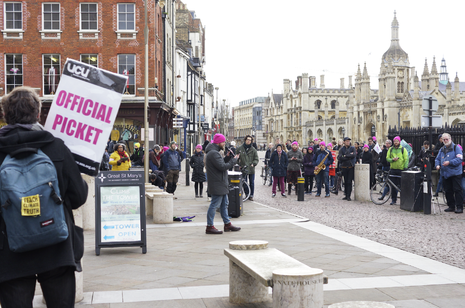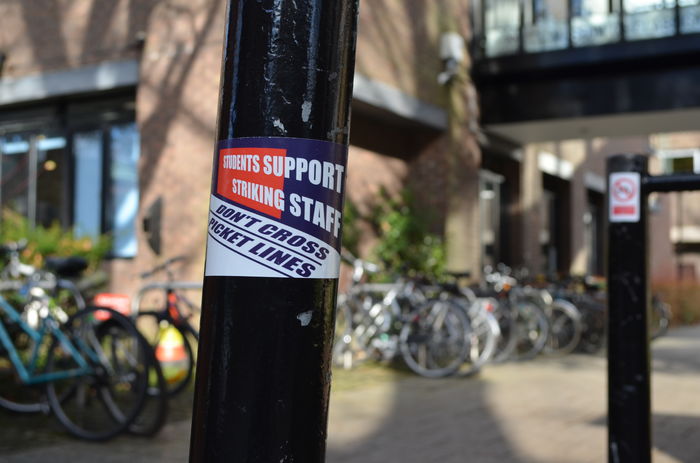Student tries to cycle into strikers
The Justice for College Supervisors campaign marched on the Old Schools to deliver 600 signed postcards supporting their aims

A student tried to cycle into protestors, shouting “Go back to work!” as campaigners marched for more secure contracts.
The Justice for College Supervisors campaign led a march on the Old Schools on 28 February as the culmination of their postcard campaign. They tried to deliver 600 postcards signed by current and future supervisors to the administration offices but were refused at the door.
The campaign, also known as #J4CS, is calling for paid mandatory training, secure contracts for supervisors, and a pay rise.
The march was followed by a rally on King’s Parade which took place at the same time as broader UCU strikes in Cambridge for the ‘Four Fights’ from 28 February to 2 March.
The #JC4S campaign says that it is targeting the casualisation of higher education workers. In 2019 there were around 5000 supervisors with nearly 90% not on payroll.
The rally took place as the UCU released its report on a survey of University Teaching Officers (UTOs), who have secure contracts. Of the 138 respondents, 81% held College fellowships.
The UCU claims that the report shows that casualisation affects securely employed staff as well. 35% of respondents felt that they could not refuse requests to take on extra supervisions, despite 46% wanting to deliver fewer. Over half were not happy with their level of pay. 51% said that they worked over 50 hours each week.
28% of supervisions were carried out by securely employed staff in 2017/18.
The President of UCU Cambridge, Michael Abberton, said “the supervision system is not working for anyone in its current set up” as it exploited casual workers and “overburdens permanent staff”.
In response, a University spokesperson said that the system gave supervisors “flexibility to choose which and how many colleges they work with and their hours” and that average pay is “well above the living wage”. They also said that as “colleges are separate legal and financial employers, they cannot be covered by a single agreement” for supervisor pay.
 News / Right-wing billionaire Peter Thiel gives ‘antichrist’ lecture in Cambridge6 February 2026
News / Right-wing billionaire Peter Thiel gives ‘antichrist’ lecture in Cambridge6 February 2026 News / Cambridge students uncover possible execution pit9 February 2026
News / Cambridge students uncover possible execution pit9 February 2026 News / Epstein contacted Cambridge academics about research funding6 February 2026
News / Epstein contacted Cambridge academics about research funding6 February 2026 News / Man pleads guility to arson at Catz8 February 2026
News / Man pleads guility to arson at Catz8 February 2026 News / John’s duped into £10m overspend6 February 2026
News / John’s duped into £10m overspend6 February 2026









